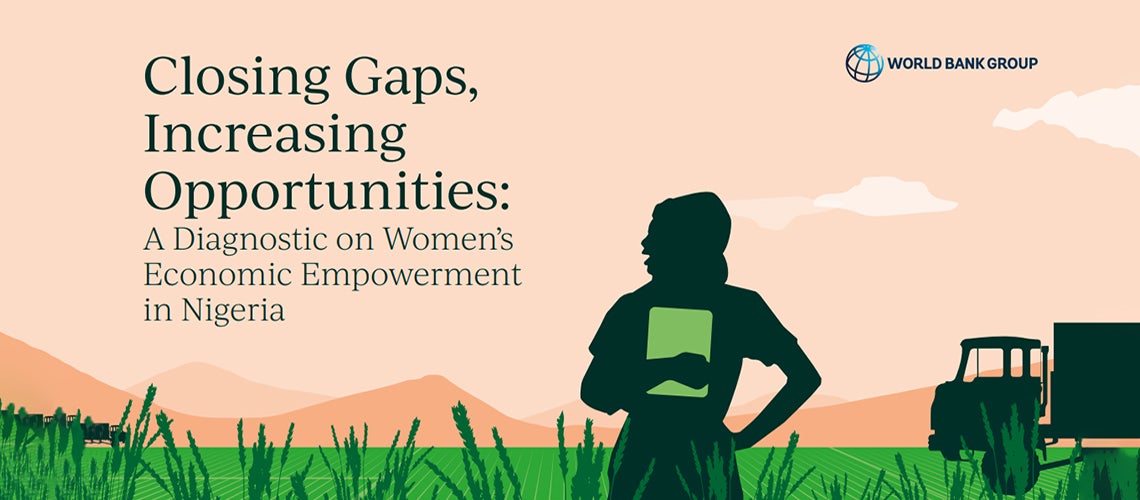 A Diagnostic on Women’s Economic Empowerment in Nigeria
A Diagnostic on Women’s Economic Empowerment in Nigeria
As Nigeria continues its critical work to lead 100 million Nigerians out of poverty by 2030 and manage its demographic transition, building the human capital of women and girls and expanding their economic opportunities and earnings will be essential. A new report from the Nigeria Gender Innovation Lab, Closing Gaps, Increasing Opportunities: A Diagnostic on Women’s Economic Empowerment in Nigeria, proposes a menu of proven and promising policy solutions to increase women’s earnings, whether they are farming, running a business, or earning wages. Using recent data from the Nigeria General Household Survey, we measure how large disparities in earnings are between women and men and investigate what are the main factors underlying those inequalities.
So what did we find?
The Size and Drivers of Economic Gender Gaps in Nigeria
Gender gaps across key sectors

Source: Nigeria General Household Survey data
First, let’s look at women farmers in Nigeria. For every hectare of land that they manage and farm, they produce 30% less than men. Of the wide range of factors that we included in the analysis of the gap, we found that three main factors can explain these differences:
- Women farm less valuable crops
- Women use less inputs, in particular fertilizer and herbicides
- Male labor working on female managed plots is less productive than when it works on male managed plots.
Addressing these three constraints in priority is important to closing gaps in earnings between women and men farmers. A few examples of evidence-backed policy solutions to close gender gaps, as highlighted in the report, include psychology and socioemotional skills-based training for farmers, engaging men to change norms around gendered crops, or digital technology for agricultural extension.
In Nigeria, the Agro-Processing Productivity Enhancement and Livelihood Improvement Support (APPEALS) project is already trying several versions of a socioemotional skills training for women in agro-processing, to test whether intra-personal or inter-personal skills matter the most to their choice of value chain and success.
Next, let’s look at women who own or run businesses. Compared to businesses managed by men, businesses managed by women have 66% lower profits. Why? Two key factors drive the profits gap:
- Women operate less capitalized businesses
- Women are more likely to sell to final customers rather than selling to other businesses.
Prioritizing policy solutions that lift these constraints is key to increasing women’s profits. For example, innovative financial products are required to ensure access to mid-size loans to growth-oriented women business owners, who often lack the necessary collateral to obtain those loans. Cash-based collateral financing is currently being piloted and evaluated within the Women Entrepreneurship Finance Initiative (WeFi), in partnership with the Development Bank of Nigeria and Access bank. If successful, those types of loans could be scaled up to increase access to finance to millions of women entrepreneurs.
Turning to the third and final sector in which women work, wage employment, we find that women’s wages are on average 22% lower than those of men. Most of the gender gap in earnings comes from the private sector, where the gap is 40%. The main factor that is driving this inequality is the sector of activity. Women are twice as likely to work in the education sector, which is also the lowest-paying sector. Diversifying women’s wage labor into other more lucrative sectors, such as manufacturing, agricultural processing, and service work will be key to closing gaps in wages between women and men.
Realizing the Gains of Equality
Gender gaps in the Nigerian economy are not only preventing women from reaching their full economic potential but are also costing the economy dearly. Estimates from the report indicate that gender gaps in earnings are costing the economy at least 2.3% of its GDP, but that number is a conservative estimate. The cost could be more than twice as high as that, suggesting that the economy could potentially gain over 22 billion dollars by equalizing earnings between and men. Therefore addressing gender gaps is essential—to improve both women’s wellbeing and boost the economy as a whole.
Nigeria can lead the way in the women’s economic empowerment agenda by doing three things:
- Prioritizing the right constraints—because not all issues and problems can be addressed at once. The constraints uncovered in the report are those where policymakers could have the greatest impact by specifically targeting the underlying drivers of economic gender gaps
- Using existing evidence to design programs and scaling what works: when policymaking is based on concrete knowledge, it can really improve women’s lives
- Encouraging innovation in programming and evaluating the impact of these innovations: more work is needed to know what the most effective interventions in Nigeria are.
To support the government of Nigeria in these endeavors, the World Bank has launched the Nigeria Gender Innovation Lab (NiGIL). NiGIL produced this diagnostic report and will generate more evidence in Nigeria on what works to empower women. NiGIL also works directly with Nigerian policymakers to help equip them with cutting-edge knowledge and evidence to support their decision-making and policy design.
Nigerian policymakers have already shown a strong commitment to this agenda. With more evidence on what works, Nigeria can make immense progress in empowering millions of women, lifting them and their households out of poverty.


Join the Conversation